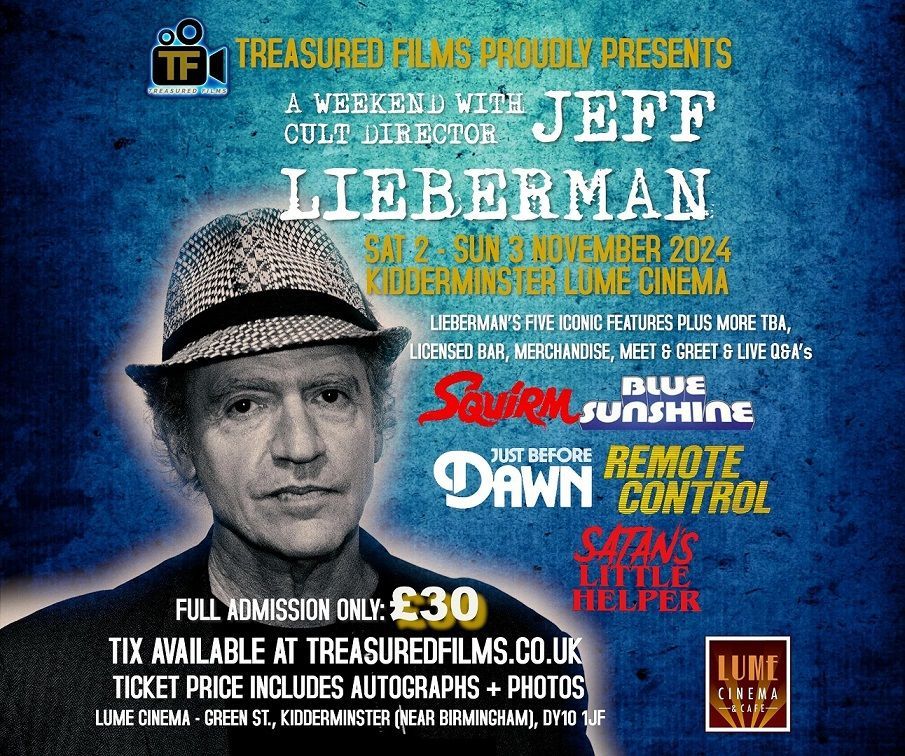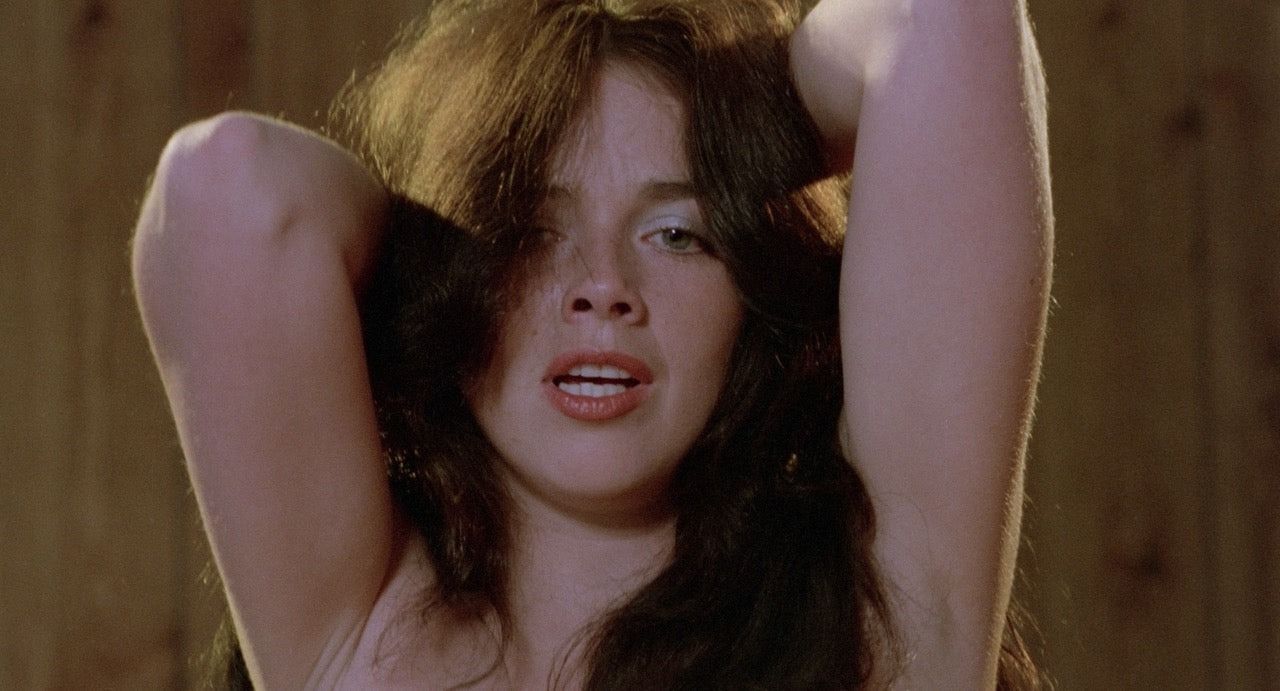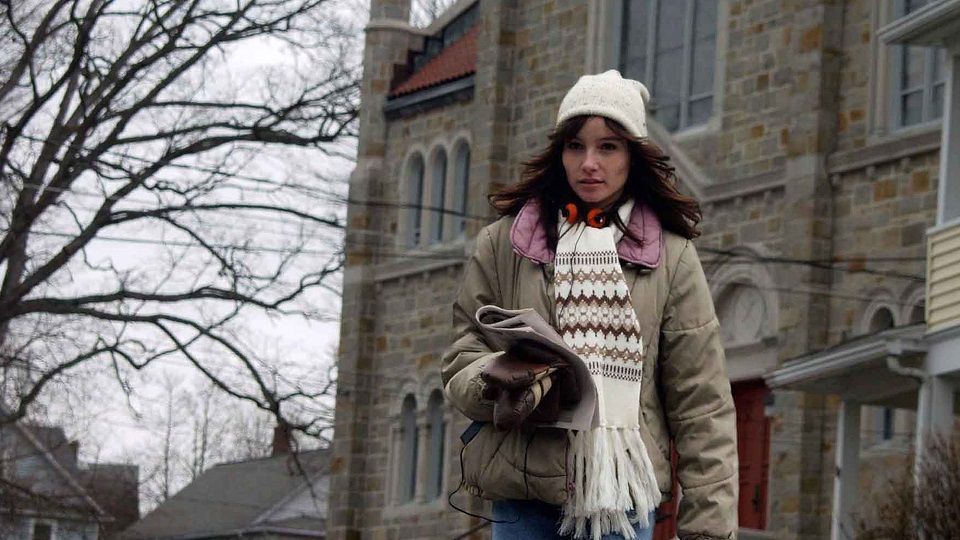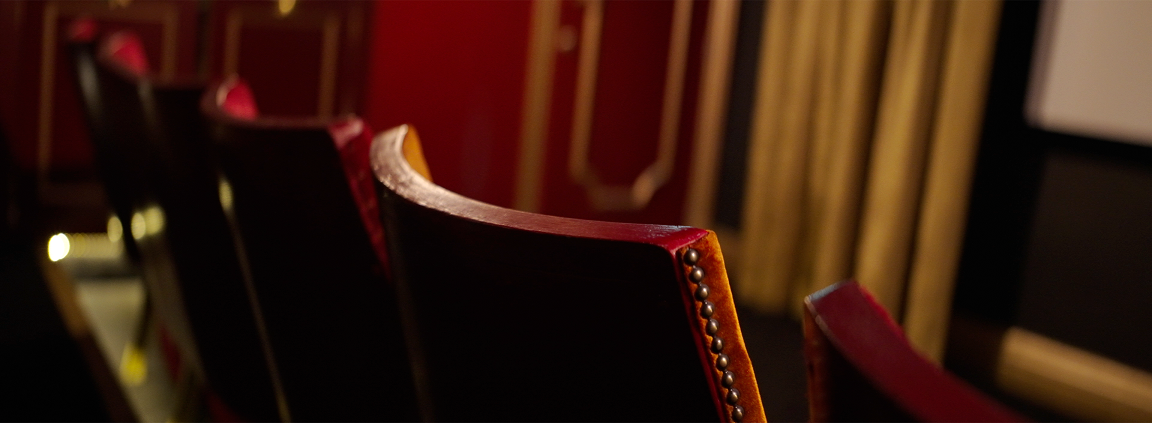Lieberman comes to Kidderminster

When Midlands based boutique Blu-ray label, Treasured Films, an offshoot of the import business Film Treasures, announced Jeff Lieberman’s 2004 slasher film Satan’s Little Helper as it second release there was talk of an event involving the director.
The company’s Graeme Lloyd and Tom Lee Rutter (director of The Pocket Film of Superstitions) said that they specifically wanted to do something in the Midlands, not only to boost the local businesses in the region – access to independent screens in the area have taken a knock in the last 18 months – but to also open doors for further events, which would not only drive audiences to the cinemas but also provide opportunities for local filmmakers.
And while Kidderminster might not be the first place many would think of when it came to opportunities to see a film director with 50 years of experience, the Futurist Cinema (aka The Lume Cinema) proved to be the ideal location. The new owner Sachia Mooney took over in July and said that he wanted to provide something akin to stepping into a Blockbuster.
“Blockbuster was a place where you could meet like-minded people and discover new films,” he said. Stepping into the foyer and bar area, you can see what he means, with shelves of video tapes lining the walls and wall-mounted TV/VHS combos playing classics as you enjoy a coffee and a roll, or a pint of local ale.
The event itself, spread across two days, enabled ticketholders to see all of Jeff Lieberman’s widely released films on the big screen, alongside some rarities that really showcased the man’s versatility. Each screening was bookended with discussions with the man himself, moderated by film scholars Darrell Buxton and Jon Towlson.
One of the key things that came out of these Q&A sessions was that Lieberman never planned on being a horror director – despite his most famous films being in the genre. In fact, there’s a huge amount to his filmography that moves closer to dark comedy, as well as more socially conscious projects.
Remote Control (1988) As if to prove that horror wasn’t the direction that Lieberman wanted to specialise in, the first screening of the event was the science fiction thriller Remote Control, starring a young Kevin Dillon and with a supporting performance from Jennifer Tilly.
It’s schlocky fun, revolving around a tape of a 1950s movie that hypnotises viewers into murdering those around them. Lieberman said that his inspiration was the rollout of video tapes, which were something alien in households and could expose people to anything. It fits into the fears over media control of the time, with links to John Carpenter’s They Live, which came out the same year, and David Cronenberg’s Videodrome (1983); although Remote Control is far more sanitised in its exploration of desensitisation.
While not the best film the weekend would have to offer, it was a crowd-pleasing affair with plenty of laughs and some wonderful tributes to 1950s sci-fi.
But… Seriously (1993) “You didn’t expect that from the horror guy, did you?”
Lieberman’s right of course, But… Seriously is probably the most obvious outlier in his widely known filmography but was also one of the best screenings of the festival. He said that he had always been a fan of standup comedy and its ability to break down major world events into punchlines. He noted before the film that there was often a gap between what news outlets reported and what comedians would say on stage, the latter of which often being closer to the truth. From the late 1950s, when comedy moved away from impressions and innuendo to a more socially conscious, aggressive style, Lieberman believed that comedy was a truer version of events and worked with producer Rob Reiner to build a compilation of news broadcasts and live comedy to show the distance between.
Part of the joy of this TV special is the early clips of legendary comedians such as Richard Pryor, Lenny Bruce and George Carlin, working from the 1960s up through comedians such as Robin Williams, Bill Hicks, Lily Tomlin, Whoopi Goldberg and Billy Crystal. On the strength of the comedy clips alone, this is worth the price of admission, but when combined with the news clips and political speeches, it turned into a thought-provoking affair. In many cases, Lieberman was right and the comedy strayed closer to what we accept as the truth (when looking at Vietnam, the Watergate Scandal, the JFK assassination and the Rodney King incident) then what was said by major news sources. Interestingly, when asked if But… Seriously could be made now, Lieberman said that comedy had lost its way. “The great thing about the comedians in the film is that you would never know who they voted for. Now they’re partisan. Whoopi Goldberg talks about politics on The View, and Bill Maher is a right-wing pundit. The scene has lost that freedom it once had.”
Just Before Dawn (1981) Lieberman started his third film as a director for hire, before insisting on rewriting the “awful” original script to be closer to a feminist retelling of Deliverance (both the 1972 John Boorman film, and the original novel by James Dickey).
While hardly breaking new ground with its premise (kids go into the woods and are picked off one by one), it’s an excellent early example of the slasher film, bolstered by a strong central performance from Deborah Benson as final girl Constance, and a cameo from George Kennedy as the park ranger who heads into the wilderness to find them. It would also be one of the first examples of having two killers in the genre, with John Hunsaker playing both hulking twins, leading to some stunning camerawork to hide the dual role.
He added that he was keen to showcase nature as one of the characters, with the cast often dwarfed in the frame by the woodland. While there’s a very real killer on the loose, Just Before Dawn uses nature as the main antagonist.

Blue Sunshine (1977)
Just before we got into Blue Sunshine, one of the most anticipated films of the weekend, we were treated to a rare screening of Lieberman’s first film, The Ringer (1972). Made for Pepsi, this anti-drug short compares peer pressure to the advertising power of big corporations. While certainly cheesy, it’s central premise around a new fashion accessory that will only take a little marketing push, and some celebrity endorsement to gain traction was more interesting than many of the anti-drug educational films that floated around at the time. On to Blue Sunshine and this was an excellent thriller, inspired by Lieberman’s own acid flashbacks. It follows Zalman King as Jerry Zipkin, who becomes embroiled in a murder mystery, with political implications, when the long-term effects of a batch of LSD start to include complete hair loss and murderous tendencies.
The murder scenes are really well done, with some particularly creepy performances from Richard Crystal and Ann Cooper, and while not everything makes 100% sense by the end, it’s fast paced and exciting enough for you to overlook it. All the performances are good, although Lieberman, who was refreshingly frank in his discussions about each film, was unimpressed with King.
“I made the mistake of suggesting that the character might be on acid, to build some ambiguity into the performance, but it didn’t work. He took it too literally, but characters aren’t supposed to have that awareness on the screen.”
Another interesting point was that Lieberman highly recommended Ken Johnson’s novelisation of the film. Instead of a straight retelling, Johnson worked from an original draft, with the story set in New York, instead of Los Angeles, and including several crucial character beats.
Satan’s Little Helper (2004) The second day started with Lieberman’s return to the horror genre after over 30 years away from it. It’s a funny little slasher film that follows Douglas Whooly (Alexander Brickel), a young kid who is obsessed with a new handheld video game, Satan’s Little Helper, so much so that when he inadvertently meets a real masked serial killer (Joshua Annex) he is unwittingly coerced into helping with some very real murders.
There’s a lot of dark humour at play in the film, using Halloween as an excuse to have many of the kills happen in broad daylight, as onlookers believe that the bloody corpses are elaborate decorations. Lieberman noted that Halloween was the only holiday he subscribed to, as he was not religious. “I believe that Halloween is the only time of the year that most people are not in costume,” he said. “Every day they put on a suit and pretend to be this professional version of themselves and then one night a year, they get to show off who they really are.”
It also showcased his common-sense approach to storytelling, with seemingly minor character quirks paying off later in the film. The fact that Douglas’ sister Jenna (Katheryn Winnick, seen here before her star making turn in Vikings) bites her nails might be a throwaway line elsewhere, but here it becomes vital when she’s unable to rip the tape of her mother’s mouth, played here by Amanda Plummer.
While the film doesn’t take itself seriously, Lieberman did say that he thought he had a point about how kids see historical and biblical figures. “There’s a distance there. These are all comic book characters to kids now. That’s why Douglas can go along with ‘Satan’ for so long.”
Till Death do us Part (2006) & The Funny (2000s) We got a couple of additional rarities from Lieberman’s back catalogue next. The first was the pilot for Till Death do us Part, a series of dramatisations of true crime stories made for Court TV. Lieberman said that he was inspired to make the show after reading a statistic that spousal homicide was the number one murder cause in the United States.
To be frank, it’s saved by the central conceit of the Groom Reaper (played by legendary director John Waters), who attends weddings and explains to the audience the series of events that lead to the murder. This breaks up the standard true crime formula, bringing a dose of dark humour to proceedings.
It was a fun half hour, and one that was picked up for a full season, retaining Waters in the host role but without Lieberman in the writing or directing chair, but was later dropped when the channel was rebranded to TruTV and switched its focus to reality shows.
A ‘what might have been’ project was The Funny, which Lieberman worked on with Tony Hendra and producer Rob Reiner in the mid-2000s. Hendra, best known as Spinal Tap’s manager in Reiner’s legendary mockumentary, played himself on the hunt for some magical ingredient to turn him into a star comedian.
Lieberman noted that a lot of the film was an exaggeration of fact. Hendra, while undoubtedly funny in his own right, had often been overshadowed. He got his start in the popular but rather unfunny duo with Nick Ullet; was the only member of National Lampoon not to be picked up by Saturday Night Live; and was often the butt of the joke in Spinal Tap. In the raw footage we saw, put together as a highlight reel to garner more funding, Reiner says that Hendra is always so close to the funny, but is never actually funny.
It's a good idea for a mockumentary, backed up by some star power with Reiner and Twiggy having key roles, but according to Lieberman it quickly fell apart due to Hendra’s tendency to burn bridges. “The final film was going to have the guys from Monty Python” – the reel has a descriptive scene indicating that John Cleese was going to be part of it – “as well as lots of others. Hendra told me he could get them, but they wouldn’t speak to him.”
There was also a discussion about Lieberman’s work with Janus Films early in his career, especially The Art of Film, which similarly to Mark Cousins’ The Story of Film, used footage from classic cinema to teach aspiring filmmakers what to do. Lieberman had stories about Rod Sterling, who did the voiceover work for the project shortly before his untimely death, including their first meeting, which played much like a meeting in Sterling’s Twilight Zone. He also had a humourous story about wanting to bring King Kong to Broadway as a musical, and even drunkenly pitched it to John Lennon, who he hoped would do the music alongside Stevie Wonder. Despite doing this behind the back of his boss, the idea got to the pitching stage, at which point it was blocked due to production starting on the poorly received 1976 remake.
Squirm (1976) Lieberman’s most popular film was also his feature debut, partially written before his work at Janus and then brought back to life when the producers were looking for a cheap ‘animal attack’ film that could be turned around quickly. Focused on a small southern town that comes under attack from electrically charged worms, it’s a surprisingly tense, gory flick, filled with excellent practical effects that were engineered by Rick Baker.
It was a crowd pleasing end to the event, and before saying his goodbyes to the audience, Lieberman was once again on hand to give some interesting titbits about the film. One particularly point of note was his ability to work with the local extras. There’s a famous scene early on, after the storm that cuts the town off, where an extra describes the weather event. According to Lieberman this wasn’t in the script, instead he simply asked the extra about memories of a storm and rolled the camera, adding some real colour to proceedings.
Speaking to Graeme and Tom near the end of the event, both said that they were thrilled with how the event had gone. “We’ve been learning all weekend about what to do and what not to do, but I think we’ve shown that there’s a real appetite for events like this in the Midlands.”
Matthew Tilt






